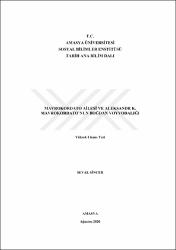Mavrokordato Ailesi ve Aleksandr K. Mavrokordato'nun Boğdan Voyvodalığı
Özet
1711 Prut Savaşı'nın ardından Eflak ve Boğdan'da başlayan Fenerliler Dönemi 1821 Yunan İsyanı'na kadar devam etmiştir. 110 yıllık bu süreçte pek çok Fenerli aile Eflak ve Boğdan'da yönetime gelmiştir. Özellikle XVIII. yüzyılın son çeyreğinde Osmanlı Devleti'nin Rusya ve Avusturya ile olan ilişkilerinde bu iki memleket hem devletlerin çekişme noktası olmuş hem de Osmanlı Devleti'nin Avrupa'daki haber alma kaynağı haline gelmiştir. Üstelik bu iki voyvodalık İstanbul'un iaşesinin de büyük bir kısmını karşılamaktadır. 1774 Küçük Kaynarca Antlaşması'ndan sonra Rusya ve Avusturya'nın bu voyvodalıklarda konsolosluk açmaya başlamasıyla Osmanlı Devleti bir yandan bu devletlerin Balkanlar'da genişleme siyasetiyle mücadele etmek zorunda kalmış bir yandan da Kırım'ın Rusya'ya bağlanması sürecini yaşamıştır. Bu çalışmada böyle bir dönemde Boğdan'da voyvodalık yapan Aleksandr K. Mavrokordato'nun voyvodalık dönemi incelenmiştir. Aleksandr K. Mavrokordato voyvodalığı süresince Rusya'nın Boğdan'daki nüfuz mücadelesine ve baskısına rağmen Osmanlıya sadık bir voyvoda olarak görevini ifa etmiştir. Aleksandr Mavrokordato hem Avusturya ve Rusya ile ilgili hem de diğer Avrupalı devletler ile ilgili edindiği bütün havadisleri Bâb-ı Âli'ye aktararak Osmanlının Avrupa'daki gözü kulağı olmuştur. Özellikle Rusya'nın Kırım'ı ilhakı sürecinde Kırım'daki gelişmeleri ve Osmanlı hudutlarındaki Avusturya- Rusya hazırlıklarını anlık olarak Bâb-ı Âli'ye iletmesiyle, Bâb-ı Âli'nin bu devletlere karşı oluşturacağı politikalarda ve alacağı önlemlerde diğer yöneticilerle birlikte referans görevi görmüştür. Osmanlı Devleti önceleri Kırım için mücadele ederken zamanla mücadelenin gerekçesi değişmiş Boğdan'ın elden çıkmaması için yapılan bir mücadeleye dönüşmüştür. After the Pruth River Campaign of 1711, the Phanariot era that started in Moldavia and Wallachia continued until the Greek Rebellion of 1821. Throughout these 110 years, many families of Phanariots came to power in Moldavia and Wallachia. Especially in the last quarter of the XVIIIth century, these two countries both became a point of contention of the states in the relations of the Ottoman Empire with Russia and Austria and became the source of information for the Ottoman Empire in Europe. Moreover, these two voivodeships covered most of Constantinople's food provision. After the Treaty of Kuchuk-Kainarji of 1774, Russia and Austria started to open consulates in these voivodeships, and the Ottoman Empire had to struggle with the expansion policy of these states in the Balkans on the one hand, and also experienced the process of connecting Crimea to Russia. In this study, the voivodeship period of Alexandros Mavrokordatos, who was a voivode in Moldavia in such a period, was examined. During his voivodeship, Alexandros Mavrokordatos performed his duty as a loyal voivodeship to the Ottoman Empire, despite Russia's struggle for influence and pressure in Moldavia. Alexandros Mavrokordatos had been the eyes and ears of the Ottoman Empire in Europe by transferring all the information he acquired about Austria and Russia as well as other European states to the Ottoman Porte. In particular, during the annexation of Crimea by Russia, he instantly conveyed the developments in Crimea and the preparations of Austria-Russia on the Ottoman borders to the Ottoman Porte and served as a reference with other administrators in the policies and measures to be taken by the Ottoman Porte against these states. While the Ottoman Empire was fighting for Crimea, the reason for the struggle changed in time and turned into a struggle to prevent the loss of Moldavia.
Bağlantı
https://tez.yok.gov.tr/UlusalTezMerkezi/TezGoster?key=fl0Kw4p1rmMDotyKRdYv1AYg0yDH_ZeGdTl6rRJLwB0clX9vb_yGy4BiRE4hjTe9https://hdl.handle.net/20.500.12450/1812
Koleksiyonlar
- Tez Koleksiyonu [318]


















